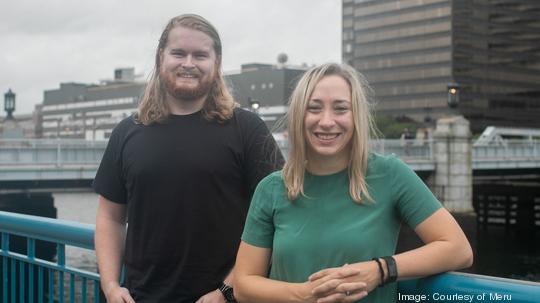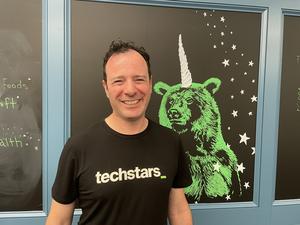
The links in your favorite social media influencer’s Instagram or TikTok bio may be changing thanks to this Somerville startup.
Meru co-founders Evelyn Hartz and James Kirk are on a mission to rid influencers’ pages of affiliate links and replace them with a new social media shopping experience. The startup helps influencers set up online shops that put all their affiliate products in one place. It also works with companies to find influencers that can best promote their products.
On Wednesday, Meru launched an app on Shopify to help the e-commerce platform’s brands find social media influencers.
“I think affiliate links really are our enemy. And there’s a way to better do this system,” Hartz said.
Hartz takes issue with how much “friction” exists in the process of using affiliate links. Influencers share affiliate links and personalized codes on their social media and receive a commission for each visit or sale they generate for a company.
To use these links, influencers need to compile all their affiliate links into a landing page, such as Linktree, and put it in their social media profilse. Then, they promote their affiliate links through content and encourage people to visit their Linktree to purchase a product. Followers then begin the process of finding the right link, remembering the code from the social media post and entering it when they make a purchase. If the followers forget to use the code or come to the site without the affiliate link, the influencer may not get paid, Kirk said.
Meru’s solution is personalized shopping pages that bring together all an influencer’s sponsored products, Hartz said. Influencers can add photos, create collections or write reviews to help sell the products. When followers make a purchase, the order gets routed to the brand to fulfill and both parties get access to data on the customer.
“The real opportunity we see is this ability to actually buy the product from the creator themselves and then behind the scenes we kind of connect the brands with the creators,” Hartz said.
Hartz said the process is also easier for brands. Meru takes care of matching brands and influencers. All brands need to do is note the products they want to promote and the commission for influencers.
Meru works with “micro influencers,” Hartz said—people who have between 1,000 to 20,000 followers on Instagram or 10,000 to 100,000 followers on TikTok. She said these smaller influencers have high engagement and there’s far more of them than the Kim Kardashians of the world.
“The process of finding and then negotiating and managing the deal and paying out is quite expensive, and that’s one of the reasons that brands don’t necessarily partner with up a thousand micro influencers and instead would rather have their two while whales,” Kirk said. “By making that process much more turnkey through our tech, a brand has a much easier time signing up a large number of creators to be their advocates.”
Meru has raised funding from Pillar VC and Visible Hands, Kirk said. He declined to share the funding amount. Hartz was a member of Visible Hands inaugural fellow cohort. Kirk and Hartz are the startup’s only full-time employees alongside a few interns.
The startup aims to pull in revenue by taking a “small percentage” of each influencer’s commission, Hartz said.
Hartz and Kirk also said they’re excited about the push toward web3 and decentralization and what that could mean for social media influencers and online shopping. While they made it clear Meru is not a crypto startup, the co-founders said the trend of individual ownership could create new opportunities in their field.
“I think that we’re seeing a lot of push toward decentralization. We’ve certainly seen that with content. That’s why there’s been such a rise of micro influencers in the creator economy,” Hartz said. “And we think that same trend is going to extend to ecommerce. And so by building around individuals and their spheres of influence, that’s really where we can unlock a lot of value.”








